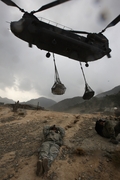 The news coming out of Afghanistan has gone from bad to worse. Now General Sir Michael Rose, ex-SAS chief and the former commander of UN forces during the Bosnian War, believes NATO forces in Afghanistan have “reached their limit”. Though he believes the insurgency can be held back by the international military campaign, NATO needs, in the ex-soldier’s view, to help form Afghan tribal militias to aid western forces and the Afghan army.
The news coming out of Afghanistan has gone from bad to worse. Now General Sir Michael Rose, ex-SAS chief and the former commander of UN forces during the Bosnian War, believes NATO forces in Afghanistan have “reached their limit”. Though he believes the insurgency can be held back by the international military campaign, NATO needs, in the ex-soldier’s view, to help form Afghan tribal militias to aid western forces and the Afghan army.
“By winning the support of the Pashtun tribes who live on both sides of the border and by developing a sympathetic understanding of their complex tribal systems, it should be possible to achieve security in the key eastern and southern areas of Afghanistan,” he says.
This blend of pessimism (about conditions) and optimism (that things can be turned around) is also reflected in the latest poll of Afghans, undertaken by the Asia Foundation. Though polls in war-torn countries are notoriously unreliable, this survey is seen as more serious than most. 38 percent of survey respondents say the country is moving in the right direction. But 32 percent say it is moving in the wrong direction. Twenty-three percent have mixed views. However, the trend towards greater pessimism since 2006, when 44 percent thought things were moving in the right direction, is clear.
Rather undermining General Rose’s idea, Afghan confidence in local militias is very low. Only just over one third of respondents – 36 perent – express any confidence in them. That is a smaller number than have confidence in government ministers and lawyers. This may, in part, be explained by the experience during the Soviet occupation in the earl 1980s. When things got tough in the south, the Red Army started talking about tribal solutions – and largely failed to make any progress.
All this will go into the mix that is General David Petraeus top-to-bottom strategic assessment of US Central Command’s area of responsibility, which is starting shortly and will finish in early 2009. The 100-person assessment team, managed by Colonel H.R. McMaster, author of Dereliction of Duty, an examination of the Joint Chiefs of Staff’s performance during the Vietnam War, will be joined by three British officials — from the Foreign Office and DfiD – and 20-odd military officers.
How the results of the Petraeus assessment ultimately blend with the views of a new U.S president, however, remains to be seen. Afghan experts on Senator Obama’s transition team – led by noted scholar Barnett Rubin – have recently been getting briefings from President Bush’ “war czar”, General Doug Lute, on NATO’s Afghan campaign. The team, said to include such experts as Marvin Weinbaum and Vanda Felbab-Brown, have strong views formed over years of research. Professor Rubin has known Afghan President Hamid Karzai for decades.
For all of General Petraeus’ influence in DC, Obama’s aides are unlikely to be swayed by any findings they do no agree with. As Joe Klein recently reported in Time Magazine, Senator Obama he has been willing to disagree with Petraeus on key issues, principally the pace of an Iraq drawdown. No doubt he will listen to Petraeus on Afghan policy, but the days when policy was made in the Pentagon and presidents followed generals may be over if the Illinois senator wins on Tuesday.






Comments